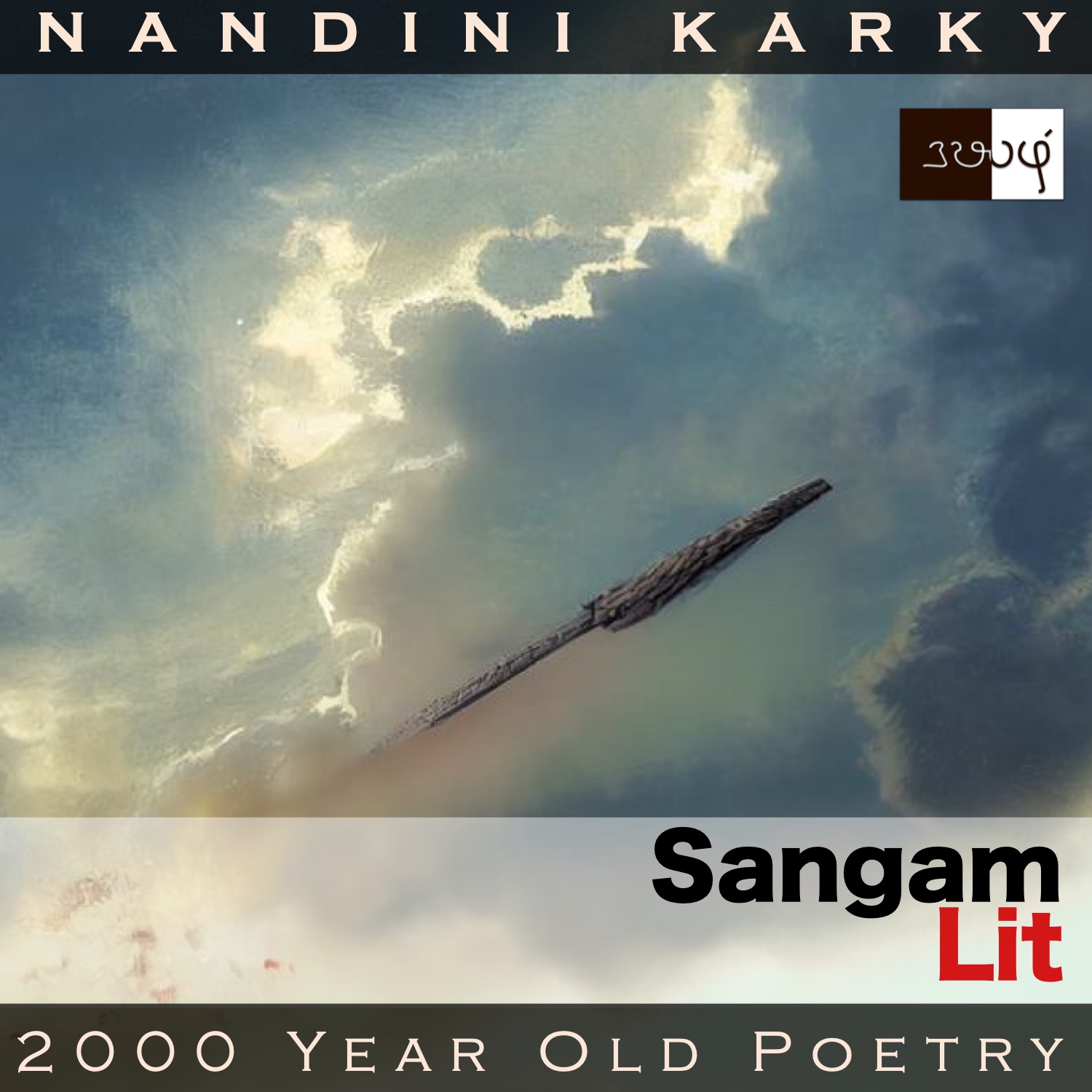Podcast: Play in new window | Download
Subscribe: Apple Podcasts | Spotify | Amazon Music | Android | iHeartRadio | TuneIn | RSS | More

In this episode, we perceive ancient customs during and after a battle, as portrayed in Sangam Literary work, Puranaanooru 25, penned about the Pandya King Thalaiyaalankaanathu Cheruvendra Nedunchezhiyan by the poet Kallaadanaar. Set in the category of ‘Vaagai Thinai’ or ‘King’s victory’, the verse talks about the events and consequences of the battle at Thalaiyaalankaanam.
மீன் திகழ் விசும்பில் பாய் இருள் அகல
ஈண்டு செலல் மரபின் தன் இயல் வழாஅது,
உரவுச் சினம் திருகிய உரு கெழு ஞாயிறு,
நிலவுத் திகழ் மதியமொடு, நிலம் சேர்ந்தாஅங்கு,
உடல் அருந் துப்பின் ஒன்றுமொழி வேந்தரை
அணங்கு அரும் பறந்தலை உணங்கப் பண்ணி,
பிணியுறு முரசம் கொண்ட காலை,
நிலை திரிபு எறிய, திண் மடை கலங்கிச்
சிதைதல் உய்ந்தன்றோ, நின் வேல் செழிய!
முலை பொலி ஆகம் உருப்ப நூறி,
மெய்ம் மறந்து பட்ட வரையாப் பூசல்
ஒள் நுதல் மகளிர் கைம்மை கூர,
அவிர் அறல் கடுக்கும் அம் மென்
குவை இருங் கூந்தல் கொய்தல் கண்டே.
A compact song speaking of this popular king once again. As we have seen in the previous poems, it was at the Thalaiyaalankaanam battlefield that this Pandya King Nedunchezhiyan defeated 7 rulers – Chera and Chozha kings and five chiefs. The poet’s words in this song can be translated as follows:
“As if the radiant sun filled with immense rage, which makes the darkness of the star-filled sky scatter away, never swerving from its tradition of moving steadily, and the moon, which renders cool light, came together upon land, came the two kings with an oath to destroy you. On that fearsome battlefield that spreads wide, you ruined both of them and stole their leather-strapped drums. At that time, your valorous spear that destroyed many a surrounding soldier, stopped before it caused total devastation, O Chezhiyan.
For just then, it saw the scene, where women with shining foreheads took up the sad ritual, as they beat against their breasts and cried, forgetting themselves in endless laments, and had their black-sand-like soft bunches of hair cut away.”
Time to delve into the view that this verse provides! The poet starts by calling upon the celestial elements of earth’s sky – the unswerving sun full of vehement radiance and the cool moon. He describes how as if both these orbs in the sky stepped down on earth, the Chera and Chozha kings arrived at the battlefield swearing to end the Pandya king. However, it was the Pandya king, who destroyed them both and seized their war-drums, which seems to be a prominent act of war by victorious kings. The famous spear of Chezhiyan that pounced fiercely and made surrounding enemies surrender, seems to have stopped its acts of ruin at one moment and this was when it saw the sight of women with shining foreheads beating their chests and crying aloud forgetting everything around them, as their long and dark hair that look like black river sand was being chopped away.
Those who are not aware of some old Indian customs may find the statement above hard to fathom. Who are these crying maiden and why are they lamenting a hair cut? – That would be their amused question. The answer to that is that this happened to be a widowhood ritual in which the head of married women was shorn after the death of their husbands. This sad practice was prevalent in many parts of India even until a hundred years ago. With the rise of India as a liberal democracy and widespread education of women, such practices are thankfully no more. Turning to the verse, we see how that how even a weapon of disaster is characterised as having a compassionate heart on seeing the distress of women. Perhaps the poet means it as the moment when the Pandya king decided not to kill those enemy Chera and Chozha kings, as he imagined the future pitiable state of their wives. Heartening to see these tiny slices of humanity even in the midst of a ruthless war!




Share your thoughts...